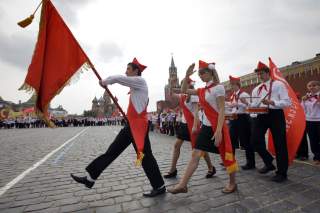The Real Reason Russians Still Have Soviet Nostalgia
Russian public opinion is nationalist, but not expansionist.
It is important to note that Russia’s elites, particularly those associated with the foreign-policy establishment, are more committed than Russia’s overall public to extending the country’s influence abroad. The most recent iteration of a survey of foreign-policy elites found that for the first time a majority (52.9 percent) agreed that the military, not the economic, potential of a country determined its position in the world. Yet the same survey also revealed that these elites (but not necessarily the innermost circle in the Kremlin) remain concerned, as are most Russians, with solving their internal problems, particularly Russia’s considerable economic difficulties.
Conclusion
Russia under Vladimir Putin is clearly a revisionist power, but the character of its revisionism, including whether it adopts neoimperial forms, is shaped by foreign and domestic influences. One of the most important of these influences is Russian public opinion. Although most Russian do not support a neoimperial foreign policy, could the Kremlin simply ignore such attitudes given Russia’s authoritarian system? Despite significant repressive capacity, authoritarian regimes, particularly “electoral” variants such as Russia, require considerable popular support to function adequately. In the Russian case, policies of confrontation abroad and militarization at home run the risk of weakening political support, in part because they further undermine domestic socioeconomic stability—which surveys consistently identify as a primary concern of most Russians.
If the Kremlin decides to risk further conflict with the West in pursuit of the Soviet past, such an escalation could threaten the Kremlin with a significant withdrawal of public consent. In its calculations, the Kremlin may assume this potential threat can be managed by its control of most mass media. Another factor is the aversion of most of Russian society to political participation and mobilization. The moderate, cautious nationalism evident in Russian today is not civic nationalism. Nevertheless, the possible political effects of a significant loss of popular support should give pause to a regime that relies for so much of its legitimacy on a single individual.
Thomas Sherlock is a professor of political science at the United States Military Academy at West Point. The views expressed in this article do not necessarily reflect those of the United States Military Academy, the United States Army or the Department of Defense.
Image: Russian Communists attend a Young Pioneer induction in Red Square in 2010. Wikimedia Commons / RIA Novosti archive, image #665547 / Ruslan Krivobok / CC-BY-SA 3.0

